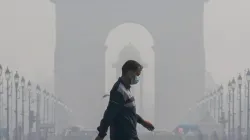GRAP Stage-III enforced in Delhi-NCR amid alarming AQI levels: Key measures announced
The Commission for Air Quality Management (CAQM) has implemented Stage-III of GRAP in Delhi-NCR as AQI levels crossed 350, indicating severe air pollution. Key measures include bans on BS-III petrol and BS-IV diesel vehicles and restrictions on construction and demolition activities.

In response to worsening air quality in the National Capital Region (NCR), the Commission for Air Quality Management (CAQM) has invoked Stage III of the Graded Response Action Plan (GRAP) with immediate effect. This decision follows a sharp rise in Delhi's Air Quality Index (AQI), which breached the 350 mark, registering 357 by 4 PM on Thursday, as per the Central Pollution Control Board (CPCB).
The Sub-Committee on GRAP convened urgently to review forecasts by the India Meteorological Department (IMD) and IITM, which indicated unfavorable meteorological conditions persisting in the coming days. The AQI, which was 297 on January 8, has worsened due to calm winds and dense fog.
Key measures under Part III of GRAP
Phase III interventions focus on preventing further damage and include the following actions.
1. Construction and demolition restrictions: Strict restrictions are imposed on high dust generation activities such as excavation, demolition, and batching plant operations, except for essential infrastructure activities, e.g trains, metro services, and hospitals.
2. Closure of stone crushing and quarrying industries: All such operations will be stopped in NCR.
3. Vehicle restrictions:
- BS-III petrol and BS-IV diesel vehicles are banned in major districts of Delhi and NCR, except for essential services and specially designed vehicles for people with disabilities.
- Diesel light commercial vehicles (LCVs) below BS-V standard, registered outside Delhi, will not be allowed to enter the city.
4. Hybrid schools for juniors: Classes up to Class V will be conducted in Delhi, Gurugram, Faridabad, Ghaziabad, and Gautam Buddha Nagar in hybrid mode.
5. Staggered Timings for Government Offices: The GNCTD and NCR state governments will implement staggered office timings for public offices and municipal bodies.
Citizen advisory
The CAQM has urged residents to take proactive steps to reduce pollution, including:
- Opting for public transport or carpooling.
- Avoiding the use of coal and wood for heating.
- Reducing vehicular trips by combining errands.
- Using electric heaters instead of open burning for warmth.
Cultural and educational adjustments
To limit exposure, schools are advised to implement hybrid learning options, allowing students and parents to decide on attendance modes. Meanwhile, the government will consider extending these measures based on AQI trends.
The CAQM emphasized the importance of collective action and cooperation from citizens to mitigate the impact of poor air quality. This is in addition to measures already enforced under Stages I and II of GRAP.
As Delhi braces for further challenges posed by air pollution, the authorities remain committed to addressing the issue through a combination of preventive and corrective measures.
Also read | Water supply disruption in south Delhi: Full list of affected areas, DJB helpline numbers